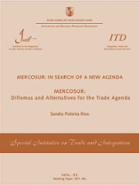MERCOSUR: Dilemas and Alternatives for the Trade Agenda
Date
Jul 2004
EDITOR
INTAL
This paper formed part of a Conference "Mercosur: In Search of a New Agenda" held in the Getulio Vargas Foundation in Rio de Janeiro in June 2003. The purpose of the Conference was to was to examine future directions for Mercosur in light of emerging political dynamics pointing to renewed interest in deepening the initiative after a turbulent 1999-2002. The papers and the conference were supported by the Integration and Regional Programs Department of the Inter-American Development Bank through its Special Initiative on Trade and Integration. The Department is grateful for the collaboration of the Foundation and in particular to Professor Renato Flores. The recent deterioration of MERCOSUR internal and external credibility stems from decisions taken by its member countries to face domestic and international conflicting issues arising in the last years. Excess of flexibility to lessen differences, a lack of enthusiasm about the bloc¿s deepening agenda, and of a common vision on the role of the integration project in development strategies for the four member countries, have caused distortion to the original project. The root of these divergences can be traced in macroeconomic policies of larger member countries and in the lack of instruments to cope with different economy sizes and to integrate the asymmetric productive structures of the four countries. The purpose of this work is to evaluate issues within the trade agenda of MERCOSUR, assessing its progress and difficulties, identifying the roots of the problems in the integration process and studying main current dilemmas. On the basis of the diagnoses some proposals are presented to be included in the bloc¿s integration agenda for the next years.




